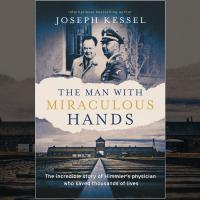The Man with Miraculous Hands is the incredible story of Heinrich Himmler's doctor, Felix Kersten, who claimed to have saved millions of lives by carefully timed requests. Himmler, suffering constantly from excruciating stomach aches and flatulence, would call on Kersten in times of need, as being the one man who could do something – through massaging the affected areas – to alleviate the pain. In time, Himmler came to depend on this Finnish doctor, not just as someone who could heal him but as someone whom he could trust. Kersten manipulated this relationship for his own ends, to keep people safe, and to rescue people from the concentration camps – including, allegedly, the entire Dutch nation. After the war, the doctor's fame spread: he was awarded one of the highest Dutch honours and nominated four times for the Nobel Peace Prize, while Hugh Trevor-Roper (at the time Oxford University's foremost specialist in contemporary history, and who verified Kersten's memoirs) considered him to be a 'shining example for human behaviour'. The book, written by a bestselling novelist and journalist who interviewed Kersten, is the enthralling narrative of this special relationship and the benefits it reaped. It has now been picked up by Hollywood, with the rotund, Epicurean Kersten played by Woody Harrelson in the upcoming film.
The book, written by a bestselling novelist and journalist who interviewed Kersten, is the enthralling narrative of this special relationship and the benefits it reaped. It has now been picked up by Hollywood, with the rotund, Epicurean Kersten played by Woody Harrelson in the upcoming film.
The Man with Miraculous Hands is presented, in effect, as an oral history. It is one man's jaw-dropping story, told through his eyes. It describes the inner workings of the Nazi regime in first-hand detail, showing the back-stabbing, the jealousy, paranoia and loneliness - as well as the fatal mixture of bureaucracy and idealism - in all its ugliness. And it vividly depicts the slick slope that many a normal person slipped down, unwitting and unwary, to find themselves at the bottom, surrounded by destruction, disaster, and damnation. But given that it was penned by a novelist, it has all the traits of a thriller: there is action, there are plot twists, there is intrigue, character development and suspense. The language, while simple, is effective, emotive, and to the point, producing a book that is immediate and pacy.
This is useful in more ways than just creating a book that is extremely readable: it reminds the audience that it is, at least in part, a work of fiction. Although Kersten's memoirs were given a glowing recommendation by Trevor-Roper – who, as brilliant a historian as he was, didn't have a particularly good track record in verifying Nazi documents – the text is littered with half-truths, exaggerations and, possibly, outright lies. The most obvious of these is the claim that he saved the entire Dutch nation from deportation. As the foreword by Norman Ohler rightly points out, although Hitler mooted the idea, there is no evidence whatsoever that even cigarette-packet-level plans were ever drawn up, let alone scrapped on the insistence of this doctor. But there are also little issues here and there: for example, a quick scan of the Nuremberg trial documents shows that the man who supposedly was trembling with fear when he introduced Kersten to Himmler felt nothing of the sort, but had actively supported and funded the Nazis since 1931. Put quite simply, it is difficult to trust The Man with Miraculous Hands. This is particularly exasperating as certain ongoing arguments - like Hitler allegedly suffering from syphilis (as asserted by Kersten) - could otherwise be put to rest.
A further claim emphasized throughout is that Kersten did not profit from the Nazi regime, that he did everything out of sympathy for the suffering of his fellow man, and out of heroism. There is no doubting that if even half of what he said is true - and certain incidents can be proven independently - then Kersten did risk the lives of himself and his family to help others. Yet regardless of whether he was actually paid in cash or not, he still profited: being able to satisfy his extreme gastronomic demands when all around him starved is one such; keeping a whole staff of unpaid servants is another. But all the while the point is belaboured: Kersten was a thoroughly good, kind, gentle man – his massive womanizing and gluttony, let alone his connections, are mere character quirks – and he deplored everything for which the Nazi regime stood.
What is more, the book implies again and again that Kersten was somehow destined to be a saviour: his Eastern teacher had a dream that the knowledge of healing must be passed on to Kersten; his Jehovah's Witness 'servants' likened him to an angel sent from heaven; the Fates kept him safe when under attack in an aeroplane. The hagiographical style runs throughout. Like many others in the Nazi regime – up to and including the Führer – Kersten seemed to possess a messiah complex: he was destined to change the world, to save it from itself. I wonder what other Nazi-like characteristics he showed.
Perhaps one, which is bound to cause some debate, is Kersten's willingness to bend – or even ignore – laws and oaths to achieve his own ends. Kersten was a doctor: he was oath-bound to heal and not harm. This is the other reason he gives for treating Himmler. Yet for all of these noble ideas, he used Himmler's pain – manipulating it, drawing it out, and sometimes refusing treatment – to achieve his goals. Many a reader will shrug their shoulders at this. After all, Himmler was evil and deserved what he got; it was, in the end, for the greater good. But in terms of a doctor's oath, there is no good or bad. And no matter how deluded, the Nazis likewise believed that the end justified the means - they, too, were trying to save the world. So does the difference actually lie, as always with the historical narrative, with history being written by the victors?
Despite this long list of faults, The Man with Miraculous Hands is nevertheless a fantastic book. The audience just need to remember to read it critically. Ohler's foreword in this new (and in the UK, first) edition certainly helps, as it encourages the reader to question from the very start. This is a book told through the eyes of a collaborator, as well as a survivor, and it should be treated as such. While not as tear-inducing, heart-wrenching, utterly devastating as either Schindler's Ark or its Hollywood adaptation, it is in a similar vein. But given that its subject had a sizeable hand in the writing of it – and that the author didn't do any independent research to verify the stories – there are also flavours of Albert Speer's Inside the Third Reich. It is an apologia, full of distortions and excuses. However, even with these qualifications, it is still fascinating: reading between the lines the book provides a new taste, a fresh insight, into life in the Third Reich - and into the SS. Despite everything, it personalizes and humanizes, and helps us to understand how people became caught up in the atrocities of the regime. And given that some version of The Man with Miraculous Hands will inevitably be a box-office hit, this edition of the book is a particularly important read, to provide some sense of incredulity to a captivating story.


